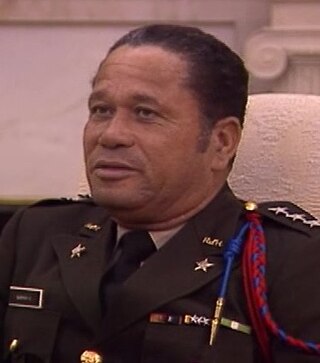| |||||
| Decades: | |||||
|---|---|---|---|---|---|
| See also: | |||||
Events in the year 2018 in Haiti .
| |||||
| Decades: | |||||
|---|---|---|---|---|---|
| See also: | |||||
Events in the year 2018 in Haiti .

Haiti, officially the Republic of Haiti, is a country on the island of Hispaniola in the Caribbean Sea, east of Cuba and Jamaica, and south of The Bahamas. It occupies the western three-eighths of the island, which it shares with the Dominican Republic. Haiti is the third largest country in the Caribbean, and with an estimated population of 11.4 million, is the most populous Caribbean country. The capital and largest city is Port-au-Prince.

A coup d'état in Haiti on 29 February 2004, following several weeks of conflict, resulted in the removal of President Jean-Bertrand Aristide from office. On 5 February, a rebel group, called the National Revolutionary Front for the Liberation and Reconstruction of Haiti, took control of Haiti's fourth-largest city, Gonaïves. By 22 February, the rebels had captured Haiti's second-largest city, Cap-Haïtien and were besieging the capital, Port-au-Prince by the end of February. On the morning of 29 February, Aristide resigned under controversial circumstances and was flown from Haiti by U.S. military and security personnel. He went into exile, being flown directly to the Central African Republic, before eventually settling in South Africa.

Matthieu Prosper Avril is a Haitian political figure who was President of Haiti from 1988 to 1990. A trusted member of François Duvalier's Presidential Guard and adviser to Jean-Claude Duvalier, Lt. Gen. Avril led the September 1988 Haitian coup d'état against a transition military government installed after Jean-Claude Duvalier's 1986 overthrow. He was President until March 1990, in a period which according to Amnesty International was "marred by serious human rights violations". He was arrested in 2001, but released in March 2004 after the 2004 Haitian coup d'état overthrew Jean-Bertrand Aristide.

Henri Namphy was a Haitian general and political figure who served as President of Haiti's interim ruling body, the National Council of Government, from 7 February 1986 to 7 February 1988. He served again as President of Haiti from 20 June 1988 after the June 1988 coup that he led, until his deposition on September 17, 1988 in the September coup.

Hérard Abraham was a Haitian military officer and politician who served as acting President of Haiti between 10 March 1990 and 13 March 1990.

The Hotel Oloffson is an inn in central Port-au-Prince, Haiti. Built in the late 19th century as a private home, it was turned into a hotel in 1935, and became known for the many artists and celebrities who stayed there. The hotel was the real-life inspiration for the fictional Hotel Trianon in Graham Greene's 1966 novel The Comedians.
Richard McGee Morse, Ph.D. was an American Latin Americanist scholar and professor at Columbia University, University of Puerto Rico, Yale University and Stanford University before finishing his career at the Wilson Center in Washington, D.C.

The National Council of Government was the ruling body of Haiti from 1986 to 1988.
Lt. Col. Jean-Claude Paul was a Haitian military officer alleged to have been involved in the illegal drug trade in Haiti. He was indicted by a Miami court on 10 March 1988 for allegedly trafficking cocaine.
The June 1988 Haitian coup d'état took place on 20 June 1988, when Henri Namphy overthrew Leslie Manigat. Manigat, who won the military-controlled 1988 general election, had taken office on 7 February.
The September 1988 Haitian coup d'état took place on 18 September 1988, when a group of non-commissioned officers in the Haitian Presidential Guard overthrew General Henri Namphy and brought General Prosper Avril to power. Namphy had been a member of the National Council of Government from 1986 until the February 1988 inauguration of Leslie Manigat, who had won the military-controlled 1988 general election. Namphy had overthrown Manigat in the June 1988 coup d'état when Manigat sought to exercise his constitutional right to control military assignments.
Leslie Delatour (1950–2001) was a Haitian economist who served as governor of the Bank of the Republic of Haiti from 1994 to 1998, and as Haiti's Minister of Finance from 1986 to 1988.

The Anti-Duvalier protest movement was a series of demonstrations in Haiti from 23 May 1984 to 7 February 1986 that led to the overthrow of President Jean-Claude Duvalier and the Duvalier dynasty regime and the readoption of the original flag and coat of arms of the country.
Emerante Morse, also known as Emerante de Pradines Morse was a Haitian singer, dancer and folklorist, and the daughter of Haitian entertainer Auguste de Pradines.
Auguste Linstant de Pradines, also known as August de Pradines, Ti Candio or Kandjo was an influential Haitian musician who largely created the archetype of the Haitian troubadour. Over nearly five decades, de Pradines composed love songs as well as songs of political and social commentary, traveling throughout Haiti to perform in clubs, at private parties, in theaters, and outdoor rallies. de Pradines had twelve children, including his daughter Emerante de Pradines Morse who also became a prominent Haitian musician, as did her son, Richard Auguste Morse, and another of Auguste de Pradines' grandsons, Michel Martelly, who also served as president of Haiti (2011-2016).
Yves Volel (1934–1987) was a Haitian lawyer, activist, and presidential candidate. He was assassinated in 1987 while running for office. He was the leader of an offshoot of the Haitian Christian Democratic Party, led by Sylvio Claude, known as the Christian Democratic Rally.
Gérard Gourgue was a Haitian politician and human rights activist. He ran for President in 1988.
Brigadier general Morton Gousse, a Haitian military officer, served as the Acting Commander-in-Chief of the Armed Forces of Haiti from 17 to 19 June 1988, under the presidency of Leslie Manigat. He was appointed by Manigat following the dismissal of Henri Namphy, and dismissed only two days later, after Namphy staged the June 1988 Haitian coup d'état.
{{cite web}}: CS1 maint: unfit URL (link)